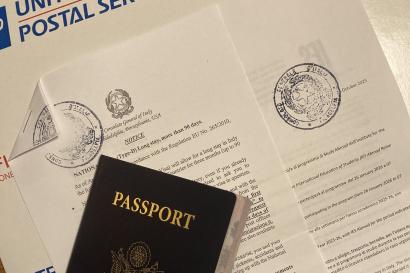There are many things that start to become apparent after living on the Galápagos for three months. The Galápagos, and even Ecuador, paints itself to be “pristine” and the paradise that tourists are looking to visit. Let’s be real, I fell into the marketing scheme early on – how can you not when the phrases “Ecuador Loves Life” is painted everywhere?
While I post pictures on facebook of the fun places I’ve visited and the “magic” that surrounds us, the reality is that I see bad and ugly things on a daily basis. It’s important to acknowledge even though it is easy to turn a blind eye.
Disclaimer: Everything listed here is only my opinion and from what I have personally seen or heard in class. And, everything here is only in regards to environmental problems.
THE GOOD
The National Parks
As part of a research project I conducted for my Political Ecology class, I investigated the process in which individuals get research permits. Because of some governmental corruption, I hypothesized that the National Parks would have a political agenda and may compromise the environment for profit. However, we came to find that the National Park really seems to keep the needs of the environment at heart. The research permit process, we found, is not corrupt in and of itself, and the parks encourage scientific research.
Quality of the Food
Yes, the food here is simple. Rice, chicken, and salad is a very typical meal. However, with that said, the food here is extremely fresh considering that most of it comes from the farms in the highlands. It is not common to over-consume and waste food, and from my experience, people tend to eat only what they need.
THE BAD
Loose Dogs and Cats
Because dogs and cats have the potential to bring about many diseases to endemic animals, there are limitations on what kind of pets can be kept. However, these regulations are not closely followed, and there are already implications on animals such as Sea Lions, who have developed a serious disease from the dogs. Why is it “okay” to kill invasive rats and goats, but not dogs and cats when they are just as invasive? There are measures being taken to sterilize these pets, but even still, is it okay to have dogs running free throughout the island?
Plastics & Garbage
There is an excessive amount of garbage on the streets where we live. There are open garbage cans right next to the beaches, and I find myself picking up on average 5 pieces of trash every day on my walk to school. Even worse? This information and these images are not allowed to be published online as it can ruin the image of the Galápagos. Yes, the picture below features a baby Sea Lion chewing on a piece of plastic...
Painting a Beautiful Image for Tourists
One of the things that bothers me the most is the marketing of the idea that the Galapagos is literal paradise…And so, any information that taints this idea is not allowed. For example, dead Sea Lions are removed and buried almost immediately, the information about excessive garbage on the islands is not allowed to be published, and tourists that take expensive cruise ships are only ever brought to areas that are “untouched by humans”.
Abuse of the Marine Reserves
There are seasons here to catch different sea creatures. However, what happens when you see people eating lobster when it is off-season? Or what about when Park officials turn a blind eye to their friends who are fishermen when they catch a little too much fish? Or, what about fishermen who claim that catching 20 hammerhead sharks were only by-catch?
Governmental Corruption
I won’t get into the political nature of Ecuador, as it is a very complicated topic. But, when we hear from speakers about the inside corruption that is occurring, it is quite concerning. For example, is it true that the President’s sister got permission to build a 160-person house on National Park land? Is it okay that the Amazonian land is being given to China as a repayment of debt?
THE UGLY
Possibly the hardest thing for me to come to terms with is the fact that problems with the Galapagos are not isolated to only the Galapagos – they are caused by all humans. Coral bleaching that I saw here? It is caused by the fact that the ocean holds 30% of the CO2 that humans emit. The abundance of plastic? A lot of this is floating to the Galápagos from other countries. Invasive species? Most of these are brought by people who travel to the Galápagos.
I have found that my own hypocrisy is disturbing. I can sit here and be critical of the taxi drivers that leave their engines running, but what about all the fuel I used to fly here from America? How can I judge the illegal fishing practices while I am excited to sit at dinner eating an absurd amount of shrimp that comes from one of the most harmful fishing practices? Is it fair for me to preach the protection of Sea Lions and Sea Turtles when in reality, one of the many boats I took during Island Hopping could have easily hurt these creatures?
The challenge is to use these lessons that we gain from the Galápagos to ultimately change our behavior and way of thinking. I am not doing any “good” if I go back to the United States and preach people to live a more environmentally sustainable lifestyle if I myself am not. The problems associated to the Galápagos do not just exist in this bubble, and before we are critical of the actions of others, I have found that we need to be critical of our own lives and choices. Only then will we be able to critically have a conversation about the environmental problems that our world faces.

Eudora Erickson
<p><span style="color: rgb(85, 85, 85); font-family: 'Lucida Grande', 'Lucida Sans Unicode', 'Lucida Sans', Verdana, Tahoma, sans-serif; font-size: 12px; line-height: 18px;">Senior at the University of Rochester studying economics, sustainability, and art. Pursuing a career in the corporate world but not-so-secretly a nature obsessed forest kid from Oregon and New Mexico.</span></p>







